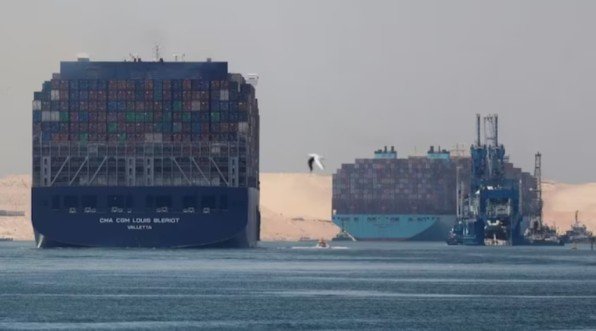Recently, there’s been a lot of worry about what’s happening in the Red Sea. Houthi militants, a group causing trouble in the area, did some aggressive things that got everyone concerned. One big event was when they tried to board a ship called Maersk Hangzhou, which flies the flag of Singapore. This went wrong, and the ship got attacked again just two days later. US Retaliates: 3 Ships Destroyed and 10 Casualties in Response to Houthi Red Sea Attack.This article will break down what’s going on, looking at how countries are responding with their military, what it means for the world’s relationships, and how it might affect the routes ships take for global trade.

1. The Houthi Red Sea Attack: US Retaliates
A big fight at sea started around 3:30 in the morning on Sunday. Some Houthi fighters wanted to get on a ship called Maersk Hangzhou. This ship was carrying a whopping 14,000 containers and was on its way from Singapore. But, the Houthi guys failed to get on the ship. This came right after the ship got hit by a missile the day before, about 55 nautical miles southwest of Al Hodeidah in Yemen.
2. Global Response: Operation Prosperity Guardian
Because things were getting worse in the crisis, the United States took action by starting something called Operation Prosperity Guardian on December 19. More than 20 countries agreed to join in and help protect ships in the Red Sea near Yemen. This teamwork from different countries shows they are serious about making sure the seas are safe for ships and that they can move around freely in that part of the world.
White House national security spokesperson John Kirby declined to say, “We have made it clear publicly to the Houthis, we’ve made it clear privately to our allies and partners in the region, that we take these threats seriously.”
3. The UK is getting involved and taking a strong position
The person in charge of defense in the United Kingdom, Grant Shapps, wrote an article for the Daily Telegraph. In it, he strongly stated that the UK is ready to take action directly. He said, “We are prepared to take direct action, and we won’t hesitate to pursue further measures to deter threats to freedom of navigation in the Red Sea.” This strong stance shows how serious the situation is, and it emphasizes their commitment to keeping important sea routes safe.
4. Shipping Industry’s Response to Houthi Attack :
The BIMCO shipping association condemned the attacks on vessels in the Red Sea and expressed gratitude towards the states involved in repelling them. Jakob Larsen, BIMCO’s head of maritime safety and security, stated, “We are thankful for the efforts of the US, French, and UK so far and hope even more states will support the coalition with naval assets or other impactful means, including diplomatic pressure on the Houthis and their sponsors.”
5. Economic Impact: Disruptions to Global Trade Routes
The Red Sea is a really important way for ships to get into the Suez Canal, which handles about 12% of all the things traded around the world. Because of the current crisis and some countries not being sure about joining a group to deal with it. Big shipping companies like Maersk are changing their usual routes. Instead of going through the Suez Canal, they’re choosing a longer and more expensive path around the southern tip of Africa, known as the Cape of Good Hope. They’re doing this to avoid the risky situation in the Red Sea.
6. Diplomatic Efforts: Calls for Iranian Cooperation
Diplomatic efforts have come. Countries are trying to solve the problem by talking to each other, and one example is the UK’s Foreign Secretary, David Cameron, asking Iran to help stop the Houthi attacks in the Red Sea. The situation is tricky because different countries in that area have their own relationships and alliances, making it more complicated to find a solution through diplomatic talks
Conclusion
The Houthi Red Sea crisis continues to unfold. As the problem with Houthi attacks in the Red Sea keeps going. Countries around the world are dealing with the challenges of maintaining maritime security, ensuring seas are safe for ships, and freedom of navigation, and addressing the broader geopolitical implications making sure they can move around freely, and able to handle the bigger political issues involved. The next few days will be really important in figuring out if the actions taken by the world can calm down the growing tensions and keep things stable in this important waterway.US Retaliates: 3 Ships Destroyed and 10 Casualties in Response to Houthi Red Sea Attack
